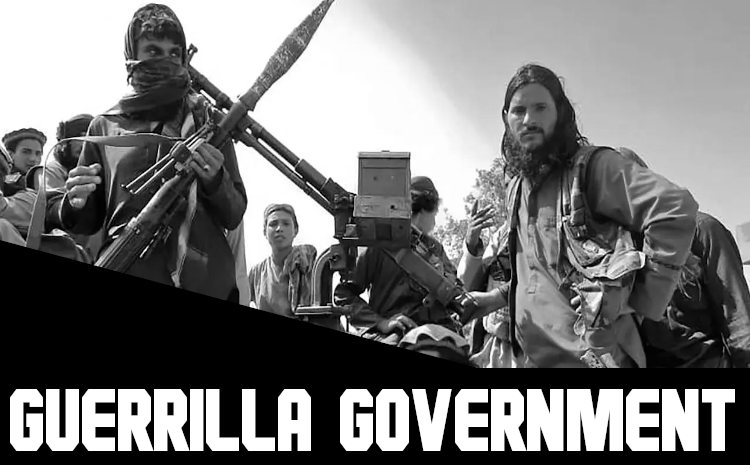A question that has come to mind is simple: “What do we do when we win?”. What I mean by this is, when we win, how do we actually transition ourselves into a modern state with all the things required of it? Thankfully, both recent and past histories contain many such examples. So let’s study how a revolutionary insurgent group becomes a modern state.
The Taliban Transition:
In August of 2021, the Taliban took over Afghanistan. This much is obvious, but then comes the age-old problem for every revolutionary. That being “you won, now what?”. Failure to answer this question is the biggest reason why revolutions fail or are defeated by counter-revolutionaries: because those in charge didn’t know what to do now that they’ve finally taken power.
The Taliban, however, with experience from their previous time as the Afghan Government from 1996–2001, knew exactly what to do. During the chaos of their takeover, they went out of their way to purge anyone who could spark a counter-revolution. This includes politicians, journalists, judges, intellectuals, activists, and so on. All were either purged or detained, awaiting execution for treason.
They even went out of their way to set up checkpoints near Kabul Airport to make sure these groups didn’t flee to the US so that they could come back one day in a Bay of Pigs-style counter-revolution.
Helped with the US military’s incompetence in leaving biometric cameras and the biometric data of everyone in Afghanistan at Bagram Airfield when they abandoned it along with much other loot. For the US military, it is cheaper to leave behind equipment and buy new equipment than to ship the old equipment back.
As a result, the Taliban has taken control and NATO has fled the country. Besides purging anyone who can form a serious counter-revolution against you, you now need to start becoming an actual country. So how do you do this?
Simple: What makes a country is its military and police strength. Without the means to exercise internal security, your new country is doomed to fail. So what the Taliban did was simple: give amnesty to all the military officers, equipment operators, and alike of the Afghan Military and Police on the condition that they train their guys to make their internal security no longer insurgent but a standard military and police force.
In return, those who agreed would not be executed, but after their job was completed, they’d be given amnesty. During the Russian Civil War, the Bolsheviks followed a similar policy with military officers of the former Tsarist regime. That being, “You come train our guys and work with us a bit, and we won’t execute you and your family for treason.”. They also developed the commissar system, where political representatives of the Bolsheviks were put within these units to put even more pressure on the ex-Tsarist military officers.
The reason why you’d do this is simple: in general, your average insurgent cannot lead a modern army right off the bat. As a modern military, it is much harder to manage than anyone appreciates. So, why not recruit those who know the basics, have them teach your guys, then shuffle them out?
In the case of the Taliban, most of the former Afghan military personnel they gave amnesty to and used this system with are mostly those who were trained by NATO on how to operate various equipment, including attack helicopters, missile defense systems, APCs, and more. These are extremely complicated things to manage, so why kill the only people who know how to manage them? Why not just promise them that you’re not going to execute them for treason if they help you out?
This is the only case in which I can support briefly bringing in members of the old system while you’re building a new one. Politicians, judges, journalists, intellectuals, activists, and alike in the civilian sector of government aren’t worth a damn and shouldn’t be kept around. These individuals offer you nothing while being a possible danger, as they can easily form a counter-revolution. Military leadership amnesty would not extend to individuals such as Generals for example, since they could also form counter-revolution and have within history.
Military officers, equipment operators, pilots, mechanics, and alike in the military sectors of government have a very low chance of this happening. Their job is to take orders, not give them. This is why, by the way, the Nuremberg Trials happened. All those executed were largely those I mentioned. Politicians, judges, intellectuals, journalists, activists, and alike. This was to prevent a German insurgency. Not because anyone gave a damn about the so-called Holocaust.
Propaganda Front:
Something other than simply constructing your own civilian and military system infrastructure. You also need to garner public support after the fact. Despite the propaganda claims, there isn’t any revolution that has been “popular”. Revolutions have always been one minority overthrowing another. That has been the history of revolution.
The October Revolution is no different. Lenin and the Bolsheviks were not popular, despite the name Bolshevik literally meaning “Majority”, they were far from it. With strength, determination, and intelligence, however, Lenin was able, with his supporters, to seize power through a coup on the much popular Russian Republic (more often known as “The Provisional Government”).
As soon as Lenin and the Bolsheviks took power, the first thing they did was quickly build and deploy a propaganda machine within Russia to persuade the lemmings that their coup was popular, and they promised things they knew the people wanted. Mostly an end to Russia’s involvement in the First World War.
Quickly, the Bolsheviks became popular among the lemmings, and Trotsky used this propaganda to conscript millions of mostly peasant lemmings into the newly formed Red Army. On top of that, they instituted the amnesty and conversion of former Tsarist military officers to turn the Red Army from an armed peasant mob into a professional military. All in preparation for counter-revolutionaries seeking to overthrow their revolution.
Propaganda is key, especially after you take power. Having an armed force isn’t enough; you also need propaganda to convince the lemming population to support your revolution as popular in order to get them to accept things like conscription into your new military and police forces.
What kind of military or police force will you have without manpower? What good will your revolutionary system be after that?
In Conclusion:
In a nutshell, hopefully this has educated readers on what a revolutionary takeover would look like. The last thing we want is to take over and then sit around wondering what the hell to do. Allowing someone more competent (Evangelical Fundamentalists, Leftists, System Loyalists, etc.) to take over.
As the worst thing to do after winning is to have no idea what you’re doing or have no plan for anything, this is what kills revolutions.

